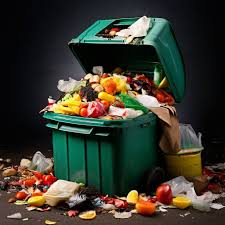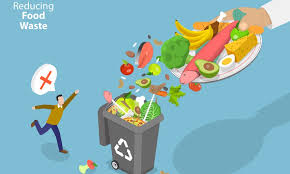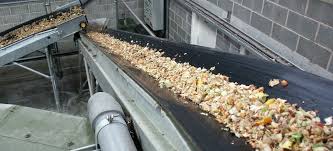![]()
If you’ve landed on this article page, you’re probably searching for a
good business idea—an idea that’s light on the pocket but heavy on
returns, promising both a fulfilling journey and potential profit.
|
How
to Start A Lucrative Food Waste Recycling Business In Nigeria
The Food Waste Recycling Business in Nigeria and Africa has
emerged as a crucial endeavor, addressing the urgent need for
sustainable waste management and environmental preservation.
With rapidly growing urban populations and increased food
consumption, the issue of food waste has gained significant
prominence. According to recent statistics, Nigeria and other
African nations collectively generate a substantial amount of
food waste annually, contributing to environmental degradation
and resource depletion.
Food waste, scientifically known as “edible discards,” refers to
any unconsumed or spoiled food materials that are discarded,
contributing to environmental degradation.
The setup period for a Food Waste Recycling Business varies
based on scale and complexity. It involves acquiring necessary
permits, setting up collection infrastructure, establishing
processing facilities, and ensuring efficient waste sorting and
treatment systems. The timeline may range from a few months for
small-scale operations to over a year for larger, more
sophisticated setups.
Production yield from raw materials depends on factors such as
waste composition, processing methods, and equipment efficiency.
Typically, food waste recycling can yield substantial amounts of
compost and organic fertilizers, which enhance soil health and
crop productivity. Additionally, biogas can be produced through
anaerobic digestion, offering an alternative energy source.
Precise production figures will vary according to regional
conditions and business scale.
1. Agricultural and Soil Enrichment: Recycled food waste can be
processed into nutrient-rich compost, enhancing soil fertility
and promoting healthier crop yields.
2. Organic Fertilizer Production: Food waste-derived compost
serves as an eco-friendly alternative to chemical fertilizers,
supporting sustainable agriculture.
3. Biogas Generation: Anaerobic digestion of food waste produces
biogas, a renewable energy source used for cooking and
electricity generation.
4. Animal Feed: Processed food waste can be transformed into
nutritious animal feed, reducing the demand for traditional feed
ingredients.
5. Vermicomposting: Earthworms break down food waste into
nutrient-dense vermicompost, used to enrich soils and enhance
plant growth.
Business Opportunities In The Food Waste Recycling Business In
Nigeria and Africa
1. Compost Production and Sale: Recycling food waste into
compost provides an opportunity to produce and sell
nutrient-rich organic fertilizers to local farmers and gardening
enthusiasts.
2. Biogas Generation: Food waste can be converted into biogas
through anaerobic digestion, creating an avenue for producing
renewable energy and selling excess power to the grid.
3. Waste Collection and Transport: Setting up a waste collection
and transport service specialized in food waste can create a
lucrative business by offering convenient and
environmentally-friendly waste disposal options.
4. Food Waste Sorting and Processing: Entrepreneurs can
establish facilities to sort and process food waste into various
by-products, such as organic fertilizers, animal feed, and raw
materials for industrial use.
5. Waste-to-Energy Ventures: Investing in technologies that
convert food waste into energy, like biogas or biofuels,
presents a promising business opportunity while addressing
energy shortages.
6. Consulting Services: Entrepreneurs can offer consulting
services to businesses, institutions, and communities on
implementing effective food waste reduction and recycling
strategies.
7. Green Packaging Solutions: Develop and market eco-friendly
packaging materials made from food waste by-products,
contributing to reducing plastic waste and promoting
sustainability.
8. Organic Skincare and Cosmetics: Utilize food waste extracts
to create natural and organic skincare and cosmetic products,
tapping into the growing demand for sustainable and cruelty-free
options.
9. Livestock Feed Production: Processed food waste can be
transformed into nutritious animal feed, offering a viable
business opportunity for livestock farmers and feed
manufacturers.
10. Research and Development: Invest in R&D to innovate new
technologies and methods for food waste recycling, positioning
your business as a leader in sustainable waste management
solutions.
11. Community Awareness Programs: Establish educational
initiatives and workshops to raise awareness about food waste
reduction, creating a platform for generating income through
sponsored programs and partnerships.
12. Green Restaurants and Catering: Launch eco-friendly
restaurants or catering services that highlight their commitment
to reducing food waste, attracting environmentally-conscious
customers.
13. Zero-Waste Packaging: Develop and market innovative
packaging solutions that minimize food waste, catering to
businesses and consumers aiming for zero-waste practices.
14. Organic Farming Initiatives: Invest in organic farming
ventures that utilize compost derived from food waste, enhancing
soil fertility and promoting sustainable agricultural practices.
15. Partnerships with NGOs and Government: Collaborate with
non-governmental organizations and government agencies to
participate in waste reduction and recycling programs,
potentially accessing grants and funding.
Types Of Food Waste Recycling Businesses In Nigeria and Africa
1. Composting Facilities: Composting businesses process food
waste into nutrient-rich compost that can be used as organic
fertilizer for agriculture.
2. Biogas Plants: Biogas facilities use anaerobic digestion to
convert food waste into biogas, which can be used for cooking
and electricity generation.
3. Animal Feed Production: Food waste can be processed into
animal feed, reducing the environmental impact of waste while
providing nutrition for livestock.
4. Food-to-Energy Facilities: These facilities convert food
waste into renewable energy sources like biogas, heat, and
electricity.
5. Organic Waste Collection Services: Businesses specialize in
collecting food waste from households, restaurants, and
commercial establishments for proper recycling.
6. Community Composting Initiatives: Community-based
organizations establish composting sites to encourage local
participation in food waste recycling.
7. Food Rescue Organizations: These groups salvage edible
surplus food from markets, retailers, and events, redistributing
it to those in need.
8. Anaerobic Digestion Plants: These facilities use anaerobic
bacteria to break down food waste, producing biogas and
digestate.
9. Vermicomposting Ventures: Vermicomposting involves using
earthworms to decompose food waste, resulting in nutrient-rich
vermicompost.
10. Organic Waste Conversion to Animal Feed: Certain businesses
focus on processing food waste into high-quality animal feed,
reducing waste while supporting livestock farming.
11. Kitchen Gardens and Urban Farming: Food waste is turned into
compost for urban gardening and small-scale farming initiatives.
12. Waste-to-Compost Initiatives: Businesses collect and recycle
food waste, transforming it into compost that is sold to farmers
and gardeners.
13. Waste-to-Energy Start-ups: These enterprises specialize in
converting food waste into renewable energy through various
processes.
14. Eco-friendly Packaging Solutions: Companies focus on
recycling food packaging waste, including biodegradable and
compostable materials.
15. Technology-driven Waste Management: Utilizing digital
platforms and apps for food waste collection, segregation, and
recycling.
Types Of Food Waste In Nigeria and Africa
1. Plate Waste: Leftovers, uneaten portions, and discarded food
from plates and meals in households, restaurants, and eateries.
2. Spoiled Fruits and Vegetables: Fruits and vegetables that
have become overripe, bruised, or spoiled due to improper
storage or handling.
3. Stale Bread and Bakery Items: Expired or leftover bread,
pastries, and baked goods that are no longer suitable for
consumption.
4. Excess Production Waste: Food waste generated during food
preparation, production, and processing in commercial kitchens
and food industries.
5. Unwanted Food Parts: Parts of fruits, vegetables, and meat
that are typically discarded, such as peels, cores, stems, and
bones.
6. Expired Dairy and Dairy Products: Spoiled or expired milk,
yogurt, cheese, and other dairy items that are no longer safe
for consumption.
7. Spoiled Meat and Seafood: Meat, poultry, and seafood that
have gone bad or are no longer suitable for consumption due to
spoilage.
8. Overstocked or Expired Packaged Foods: Packaged foods, canned
goods, and snacks that have reached their expiration date or are
no longer saleable.
9. Leftover Beverages: Unused or unfinished beverages, such as
coffee, tea, and juices, that are discarded after consumption.
10. Peelings and Trimmings: Outer peels, rinds, and trimmings
from fruits and vegetables that are often discarded during meal
preparation.
11. Plate Scrapings: Residue and scraps left on plates, such as
bones, skin, and small food particles.
12. Expired Grains and Cereals: Cereals, rice, pasta, and other
grain-based products that have passed their shelf life.
13. Overripe or Damaged Produce: Fruits and vegetables that have
become overripe, damaged, or bruised and are no longer suitable
for sale or consumption.
14. Leftover Cooking Ingredients: Excess or unused cooking
ingredients, such as spices, herbs, and sauces, that are not
used in recipes.
15. Unsold Food from Markets: Unsold fresh produce, seafood, and
other perishable items that remain at markets and stalls.
How To Start The Food Waste Recycling Business In Nigeria
1. Research and Planning: Before starting a Food Waste Recycling
Business in Nigeria and Africa, conduct thorough research on
local waste management regulations, market demand, and potential
competitors. Develop a detailed business plan outlining your
goals, target market, recycling methods, and financial
projections.
2. Legal and Regulatory Compliance: Register your business and
obtain any necessary permits or licenses from local authorities.
Ensure compliance with environmental regulations and waste
management laws to operate legally and responsibly.
3. Site Selection: Choose an appropriate location for your
recycling facility, considering factors such as proximity to
food waste sources, transportation access, and environmental
impact.
4. Equipment and Infrastructure: Acquire the necessary equipment
for food waste collection, sorting, processing, and recycling.
This may include composting machines, shredders, waste bins, and
transportation vehicles.
5. Collection and Segregation: Develop a system for collecting
food waste from various sources, such as households,
restaurants, and markets. Implement proper segregation practices
to separate organic waste from non-biodegradable materials.
6. Recycling Methods: Select suitable recycling methods such as
composting, anaerobic digestion, or vermicomposting, depending
on the scale and resources of your business.
7. Compost Production: Process organic food waste into
high-quality compost or fertilizer. Ensure proper aeration,
moisture control, and temperature maintenance during composting.
8. Quality Control: Regularly monitor and test the quality of
compost produced to meet industry standards and customer
expectations.
9. Packaging and Distribution: Package the recycled compost in
user-friendly containers and distribute to local farmers,
gardeners, and agricultural businesses.
10. Marketing and Outreach: Develop a strong brand identity and
marketing strategy to promote your food waste recycling
services. Educate the public about the environmental and
economic benefits of recycling through various channels,
including social media, workshops, and community events.
11. Partnerships and Collaborations: Collaborate with local
governments, NGOs, and other stakeholders to enhance your
business’s visibility and impact.
12. Employee Training: Provide proper training to your staff on
waste collection, sorting, recycling techniques, and safety
protocols.
13. Record Keeping and Reporting: Maintain accurate records of
waste collection, processing, and sales. Prepare regular reports
to track your business’s performance and make informed
decisions.
14. Scaling Up: As your Food Waste Recycling Business gains
traction, consider expanding your operations by reaching more
customers, increasing processing capacity, and exploring new
markets.
15. Continuous Improvement: Stay updated with industry trends,
technology advancements, and best practices in food waste
recycling. Continuously improve your processes and services to
maximize efficiency and sustainability.
Types Of Equipment & Tools Used In The Food Waste Recycling
Business In Nigeria
1. Food Waste Collection Bins: Collection bins are used to
gather food waste from households, restaurants, and commercial
establishments.
2. Food Waste Sorting Equipment: Sorting equipment helps
segregate different types of food waste for appropriate
recycling methods.
3. Composters: Composters facilitate the decomposition of food
waste into nutrient-rich compost.
4. Anaerobic Digesters: Anaerobic digesters break down food
waste in the absence of oxygen, producing biogas and digestate.
5. Vermicomposting Units: Vermicomposting units house earthworms
that consume and process food waste.
6. Bokashi Bins: Bokashi bins are used for fermenting food waste
through the bokashi method.
7. Black Soldier Fly Larvae Farms: Facilities for rearing black
soldier fly larvae to process food waste and produce larvae.
8. Biogas Generators: Biogas generators convert food waste into
biogas, which can be used for cooking or electricity.
9. Incinerators: Incinerators burn food waste at high
temperatures, reducing it to ash and energy.
10. Food Waste Dehydrators: Dehydrators remove moisture from
food waste, reducing its volume and weight.
11. Nutrient Extraction Equipment: Equipment for extracting
valuable nutrients from food waste for use in agriculture.
12. Packaging and Labeling Machinery: Machinery to package and
label recycled food waste products for sale.
13. Food Waste Processing Machinery: Machinery for processing
food waste into different products like animal feed or
fertilizers.
14. Trucking and Transportation Vehicles: Vehicles to transport
collected food waste to recycling facilities or end-users.
15. Quality Control and Testing Equipment: Equipment for testing
the quality and safety of recycled food waste products.
As the global focus on sustainability and circular economy
principles grows, the Food Waste Recycling business has the
potential to play a pivotal role in achieving waste reduction
and resource optimization objectives. By investing in innovative
technologies, education, and policy frameworks, Nigeria and
Africa can position themselves as leaders in the food waste
recycling sector, contributing to a healthier environment and
more sustainable future. Get our Practical Guide on How to start a Food waste Recycling business in Nigeria. This comprehensive guide will walk you through the fundamentals of starting and running a successful Food waste Recycling business in Nigeria, from initial planning to profitability. We’ll cover key factors like identifying in-demand niches, establishing a strong brand, marketing effectively, optimizing operations and delivering an exceptional student experience.
|







